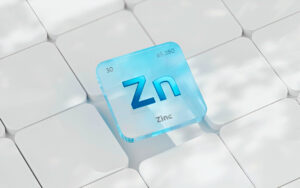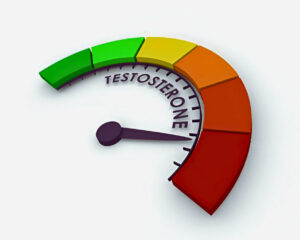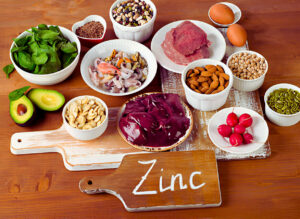Ever wonder why some folks pop zinc supplements like candy during cold season? Or why it’s suddenly being hyped in skincare, energy drinks, and even… bedroom conversations? Yep. You heard that right. Zinc is kinda a big deal — and not just because your mom told you to eat more leafy greens. So let’s dive into the wild world of zinc and see what it actually does for your body — and why you might be missing out if you’re low on it.
So… What Is Zinc, Anyway?
Let’s keep it simple. Zinc is a trace mineral, meaning your body only needs a lil’ bit — but that lil’ bit does a whole lotta work. Think of it like the backstage crew of a concert. Not always seen. But without it? The show’s a disaster.
Zinc is what keeps your body’s functions running smoothly. It helps with things like:
-
Immune support (goodbye, sniffles)
-
Healing wounds faster
-
Making proteins and DNA
-
Supporting growth during childhood, adolescence, and even pregnancy
-
Reproductive health (yup… more on that juicy part in a sec)

What Does Zinc Do for the Body?
This mineral may be small, but the benefits of zinc are seriously massive. Here’s a peek into how it’s working for you behind the scenes:
Boosts Your Immune System
Feeling under the weather more than usual? You might be low on zinc. It helps activate T-cells, which are like the bouncers of your immune system — kicking out viruses and bacteria like they’re rowdy club-goers.
Speeds Up Wound Healing
Cut yourself while slicing an avocado? Zinc’s your buddy. It plays a role in repairing skin and keeping inflammation under control. That’s why you’ll find zinc oxide in a lot of skin creams and ointments.
Supports Healthy Vision
Zinc’s involved in transporting vitamin A from the liver to your retina. No zinc? Say hello to night blindness and dry eyes.
Improves Brain Function
You want focus? Better memory? Zinc helps neurons talk to each other. And when those signals fire right, your brain’s sharper, calmer, and more productive.
Balances Hormones & Metabolism
Zinc works with your thyroid, pancreas, and even testosterone production. Whether you’re trying to boost energy, support your metabolism, or just feel more “on,” zinc has your back.
The Benefits of Zinc Sexually (Let’s Get Spicy)
Alright, let’s talk about what everyone lowkey Googles — the benefits of zinc sexually. And guess what? The hype’s real.
Zinc can:
-
Boost testosterone levels (in both men and women)
-
Improve sperm quality and count
-
Increase libido
-
Support prostate health
Low zinc = low bedroom energy. So yeah, zinc might just be the underrated MVP of your love life. Some studies even show that men with higher zinc levels have healthier sexual function and fewer issues with performance.

Sources:
Zinc Deficiency Symptoms: Are You Missing Out?
You could be zinc-deficient and not even know it. It’s sneaky like that. Some common signs to look out for:
-
Constant colds or infections
-
Poor wound healing
-
Hair thinning or hair loss
-
Low sex drive
-
Brain fog or memory issues
-
Taste or smell disorders
-
White spots on nails
-
Acne or skin flare-ups
Sound familiar? You might wanna up your zinc game.
Foods High in Zinc You Should Totally Eat More Of
You don’t need to run out and grab a bottle of zinc pills just yet. Nature’s already stocked the shelves with a bunch of delicious, foods high in zinc.
Here’s a quick list of zinc-rich foods:
-
Oysters (zinc royalty, seriously)
-
Red meat (like beef and lamb)
-
Chicken and turkey
-
Pumpkin seeds
-
Cashews
-
Chickpeas
-
Lentils
-
Quinoa
-
Dairy products
-
Eggs
-
Dark chocolate (bless)

Zinc-Rich Foods Table
| Food Item | Zinc per Serving | Serving Size |
|---|---|---|
| Oysters | 74 mg | 6 oysters (cooked) |
| Beef (chuck roast) | 7 mg | 3 oz |
| Pumpkin Seeds | 2.2 mg | 1 oz |
| Chickpeas | 1.3 mg | ½ cup (cooked) |
| Cashews | 1.6 mg | 1 oz |
| Yogurt | 1.7 mg | 1 cup (plain, low-fat) |
How Much Zinc Per Day Do You Actually Need?
Your body doesn’t store zinc, so you gotta get a steady supply through food or supplements. Here’s what you should aim for:
-
Adult men: 11 mg/day
-
Adult women: 8 mg/day
-
Pregnant folks: 11-12 mg/day
-
Breastfeeding: 12 mg/day
But don’t go overboard. Too much zinc can mess with copper absorption and upset your stomach. Balance is key.
Zinc Supplements and Zinc Oxide: Worth It or Nah?
Alright, maybe you’re not big on oysters or lentils. That’s where supplements come in. But not all zinc supplements are made equal.
Types of Zinc You Might See:
-
Zinc Gluconate – common in cold lozenges
-
Zinc Picolinate – easier on digestion
-
Zinc Citrate – good absorption
-
Zinc Oxide – mostly used for skin stuff, not as great internally
Check with your doc before grabbing any supplements, especially if you’re taking other meds or have health conditions.
Why Zinc Is Even More Important Than You Think
Still not sold on zinc? Let’s put it this way — without zinc, your immune system limps along, your skin freaks out, your sex drive tanks, and your body basically short-circuits. It’s that vital.
And we don’t talk about it enough. It’s not as sexy as protein or as trendy as magnesium, but it’s working hard in the background to keep you functioning like a boss.
FAQs About Zinc (Cuz We Know You’re Curious)
Q: Can I get too much zinc?
Yes, over 40 mg a day regularly can lead to nausea, headaches, and copper deficiency.
Q: Is zinc good for acne?
Totally. It reduces inflammation and bacteria, making it a skincare superhero.
Q: Does zinc really help with colds?
Studies say yes — it may shorten colds if you take it early enough.
Q: Is zinc good for women’s health?
Absolutely. It helps with hormone balance, immunity, and even fertility.
Q: What’s better — food or supplements?
Food first, always. But supplements are great if your diet’s lacking or if you’ve got absorption issues.
In Conclusion… Zinc Deserves More Respect
So what is zinc good for? Practically everything. From helping your immune system kick butt to giving your sex life a subtle nudge, it’s the unsung hero of health.
Make sure you’re getting enough, whether it’s from food or a daily supplement — and keep an eye out for those sneaky zinc deficiency symptoms.
Sources:
-
NIH Zinc Fact Sheet – April 2024
-
Healthline: Zinc Benefits – March 2024
-
Harvard School of Public Health – Zinc – April 2024
